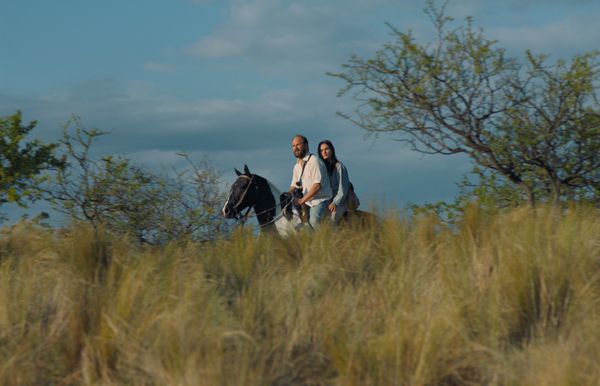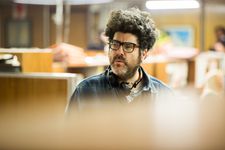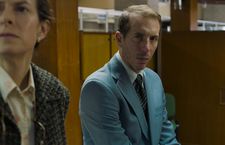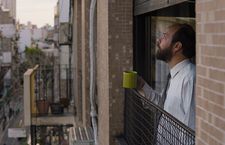 |
| Daniel Elías and Margarita Molfino in The Delinquents Photo: courtesy of MUBI |
Rodrigo Moreno’s The Delinquents is, to my mind, one of the best films of 2023, even if it does make him blush when I say so. He’s one of those people of unusual intelligence who still seems a little surprised when people notice it. The characters in the film are not quite as sharp, but are nonetheless interesting, and learn as they go along. There’s Morán (played by Daniel Eliás) who, rather than spend his whole life working, decides to rob the bank where he works, hide the money, turn himself in and spend a shorter period of time in prison; and there’s Román (Esteban Bigliardi), whom he chooses as his accomplice. It’s how things develop subsequently, however – and how the film explores the limited framework of the men’s thinking – that makes it so intriguing.
 |
| Rodrigo Moreno on the set of The Delinquents Photo: courtesy of MUBI |
“First of all, there was a producer that proposed that I see an old Argentine film from the Forties, titled Hardly A Delinquent, by Hugo Fregonese, who was a filmmaker that continued his career in Hollywood making B films after making that,” he tells me. “Not to make a remake, but to think something about it, because the premise of that film was a man who wants to take money from his work, hide it and go to prison. But the complicated point to me was that his desire in making this plan was to have a luxurious life, to become a millionaire. So that was not interesting to me, and the character of that film was not interesting, as he was shown as a mischievous guy.
“I abandoned that project for many years, and I made other films. At certain moments, that idea came back somehow, but now in a different way, because I thought ‘What if instead of one, there are two?’ I preserved the name of the character, which was Morán. So I imagined, as a game, the anagram and a kind of doppelganger. And I created Román. And from that moment on, I decided to take a different journey and to appropriate that subject and that story to my dreams and my languages.
“That's how I understood that the film had to be more about freedom than money, a film that could begin as crime and then turn to different genres, like comedy or uncertainty in general. I didn’t know which because films at certain moments get lost and you don't know what's next. And that freedom, which, of course, is the subject of the film, the need to get rid of the routine and try to liberate ourselves in terms of dependencies, led me to a free form also, because it would have been a contradiction to speak about freedom or liberty in a very square and strict structure. In this case, I decided it was enough of an excuse to allow me to open up the film form.”
I tell him that I find it interesting in part because the story unfolds over a long time, and the characters’ ideas of freedom change over that time. Obviously, prison is not really what Morán expects. He discovers a kind of freedom in books when he's there. But at the same time, Román feels trapped to begin with, and then when thinking about the money, he starts to see freedom in a different way.
 |
| Esteban Bigliardi as Román in The Delinquents Photo: courtesy of MUBI |
“Yeah,” he says. “because what Morán discovers during prison, of course, it's literature and poetry. But what he finds in poetry, it is the unproductive time. It’s what he discovers when he meets the Chilean director, a filmmaker who's making a film that nobody understands what kind of film it is, above all himself. So that's why, in the end, I don't care about the money. That's why, in the end, I decided to show this guy riding this horse in the middle of nowhere, in such a grave landscape, looking for something else, which is not money, which is not materiality. And on the contrary, Román has the prison of routine. We see the daily routine, through his eyes, through his experience. But at the same moment, he's in the middle of an investigation because he has to hide money in his wardrobe.
“The structure I found, finally, during the montage, during the editing, is that Román follows Morán's steps to finally find the same revelation Morán had in the beginning. So it's like two similar roads in a different timing to get the same goal.”
I ask about the development of that third character, Norma. To begin with it seems as if being with her can give people some freedom that is attached to her, but she isn't recognised initially as a separate person with her own direction. Was that how he intended it to work?
“First of all, I didn't want to build a femme fatale. But what I took from the femme fatale model is the fact of being someone independent, with a strong character, with a strong vision of life. That's why she's the one who confronts them somehow in terms of the dreams Morán has, in terms of the future. “Let's get married, let's have kids.” And she looks at him like, “What are you talking about? It's just life. It's just the present time. We are now having a good time, and that's it. Why you have to plan everything?” And when Román confesses to her the crime and plan also, she is totally perplexed and says “You're stupid and your friend is a madman.” I really love that reaction of hers. She demonstrates she's not a silly girl, she's not a silly character.
 |
| Daniel Elías as Morán in The Delinquents Photo: courtesy of MUBI |
“She represents herself, first of all, but she represents also the consequences of leading a free life. So that's why she reacts the way she does. It was not easy to develop this kind of freedom, for her. Of course, I had a great actress, a fresh and beautiful and intense actress that allowed me to do this. She was a great vehicle to convey those ideas or concepts I had for the character.”
We talk about the supporting characters in the film and the way that their small but well honed performances tell us about the impact of Morán and Román’s choices on the world around them – on other people’s freedoms.
“What I wanted to make was a film where all the secondary characters have their moments,” he says. “Normally, secondary characters are obliged to give their lines and perform their functions in a structure, but I don't care about functionality in general. That allowed me to create moments for them and to stay one moment more with them. That's the way I worked in terms of not only the staff in the bank, but Román and Norma in the hills, or Román's wife and her music students, which are my own kids.
“Talking about this, I realised when I had to take decisions on how I would show the passing of time, of these three or four years – while I was wondering about this question, real time was going by because I had to stop the shooting many times. That's why it took us more than four years to shoot the film. So at a certain moment, in the end of the process of the shooting, I realised ‘Okay, I can show my kids again,’ because I shot their scene in 2018, and we were in 2022. So I said ‘Okay, it's four years later for them in the real sense, in the biological sense. So my kid, who was ten-years-old then, now he was 14-years-old. So it showed the materiality of the passage of time.”
The Delinquents is in UK cinemas from Friday 22 March.





















